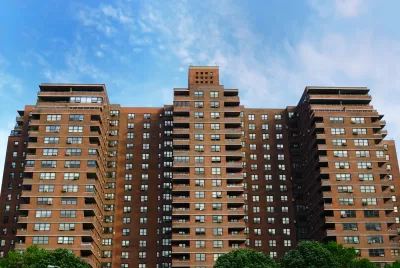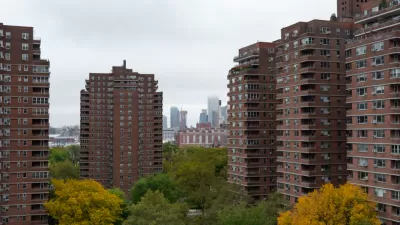A new assessment from the city’s housing agency calls for $60 billion in needed repairs over the next five years.

Repairing and renovating New York City’s aging public housing stock will cost more than $78 billion, reports Mihir Zaveri in The New York Times, an estimate 70 percent higher than in 2017.
According to Zaveri, the high cost “largely reflects inflation and growing construction costs, and underscores the staggering challenge facing city officials and the New York City Housing Authority, which runs the system of more than 2,100 buildings.” The agency says roughly $60 billion will be required in the next five years to repair things like boilers and heating systems. As Zaveri explains, “After a federal investigation, the city reached a settlement in 2019 that led to the appointment of a federal monitor to scrutinize NYCHA’s progress on dealing with some of its most serious problems, including lead, mold and heating failures.”
“Unique pockets of affordability” in a notoriously expensive city, NYCHA developments house over 330,000 New Yorkers, with almost 275,000 families on the agency’s waiting list.
During his administration, Mayor Adams has focused on shifting NYCHA developments to private management, which “could allow the agency to tap into billions of dollars in loans and subsidies, and could also lead to the demolition of some buildings.”
FULL STORY: New York City’s Public Housing System Now Needs Almost $80 Billion

Planetizen Federal Action Tracker
A weekly monitor of how Trump’s orders and actions are impacting planners and planning in America.

Map: Where Senate Republicans Want to Sell Your Public Lands
For public land advocates, the Senate Republicans’ proposal to sell millions of acres of public land in the West is “the biggest fight of their careers.”

Restaurant Patios Were a Pandemic Win — Why Were They so Hard to Keep?
Social distancing requirements and changes in travel patterns prompted cities to pilot new uses for street and sidewalk space. Then it got complicated.

Platform Pilsner: Vancouver Transit Agency Releases... a Beer?
TransLink will receive a portion of every sale of the four-pack.

Toronto Weighs Cheaper Transit, Parking Hikes for Major Events
Special event rates would take effect during large festivals, sports games and concerts to ‘discourage driving, manage congestion and free up space for transit.”

Berlin to Consider Car-Free Zone Larger Than Manhattan
The area bound by the 22-mile Ringbahn would still allow 12 uses of a private automobile per year per person, and several other exemptions.
Urban Design for Planners 1: Software Tools
This six-course series explores essential urban design concepts using open source software and equips planners with the tools they need to participate fully in the urban design process.
Planning for Universal Design
Learn the tools for implementing Universal Design in planning regulations.
Heyer Gruel & Associates PA
JM Goldson LLC
Custer County Colorado
City of Camden Redevelopment Agency
City of Astoria
Transportation Research & Education Center (TREC) at Portland State University
Camden Redevelopment Agency
City of Claremont
Municipality of Princeton (NJ)



























